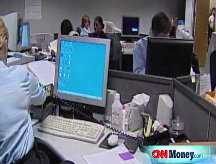Overseas outsourcing heats up again
As sales drop and business owners look for ways to cut their overhead, sending jobs to cheaper locations is an option back on the table.
 |
| InsideAvenue.com owner Tessa Luu says she'd be out of business by now if she hadn't outsourced all her operations. |
 |
| InsideAvenue.com has its Web programming in Wisconsin, customer service in Iowa, data entry in the Philippines and shipping in North Carolina. |
(CNNMoney.com) -- Two years ago, when the economy was booming, Tessa Luu's furniture showroom in Los Angeles was running smoothly. But Luu was tired of the rising electric bills, salaries, benefits and rent that ate her profits. So she undertook a radical move to cut all the overhead: She said goodbye to her five employees and moved her business online, hiring outsourcers to run the operation.
Though she didn't know it at the time, the move would save the company. It took her six months to get settled, but the change paid off - she's cut her operating costs by 75%. Far fewer consumers are remodeling today due to the weak economy, but last month InsideAvenue.com had its best month ever for sales.
"I would be bankrupt now had I not changed my model," she says.
Many business owners are following in Luu's footsteps in order to control spending. Consero Global Solutions, an Austin firm that outsources accounting work to India for its clients, has seen its business surge to unprecedented levels in the past two months, according to COO David Zahn: Its pipeline of inquiries has more than doubled since this summer.
"We see the dire situations, where employers replace employees with outsourcing, and we see those who need to shift resources so that employees can freely engage in strategic work that will keep the business alive," Zahn says. Most of Consero's clients are midsize companies with 200 or fewer employees. The company says it can cut their accounting costs by 50% to 60% by moving the work overseas.
Alsbridge, a Dallas consulting company that advises companies considering outsourcing, has also seen a growing demand for its services. Though most Alsbridge clients are large businesses, founder and CEO Ben Trowbridge sees small business owners having the same problems as CEOs at Fortune 500 companies and looking for any opportunity to shave costs out of their business.
"It's classic for small businesses to outsource in waves," he says. "Because the current financial crisis is acting as a catalyst for companies to seriously consider outsourcing, we are riding that wave."
But as Luu discovered, outsourcing isn't a quick fix. "I wasted tens of thousands not hiring the right company for my programming and data entry," she says. "I ended up having to redo the work and spend time researching other firms and getting referrals before I found the right people."
Rusty Luhring, owner of software developer Luhring SurvivalWare in Alexandria, Va., is an advocate of outsourcing, but also ran into trouble when he outsourced his programming operations to a firm in Pakistan that was unable to translate the material correctly. Like Luu, Luhring wound up spending more time fixing the work than he would have had the project stayed in-house.
"In a way, it's like hiring a new employee," Luhring says. "There's a learning curve. I encourage experimentation first, by outsourcing only a small percentage of the company's work and then scaling up if needed once you know you've got a good firm."
Alsbridge's Trowbridge warns that the process takes research and time, which many struggling business owners can't spare right now. Owners will need to set the scope of their outsourcer's duties, evaluate costs and locations, and decide how much flexibility and control they require. Luu had many decisions to make, given that she outsourced every task: Web programming now takes place in Wisconsin, customer service in Iowa, data entry in the Philippines and shipping and packaging in North Carolina.
Her decision to keep most of the work in the U.S. was based mostly on skill needs, but she couldn't ignore the cost of her location choices. "I stay outside of the expensive states and cities," she says.
Even business owners that would prefer to keep their jobs domestic can be lured into outsourcing by the financial advantages. "It's typically 70% more expensive to do work in the U.S. than in India," Trowbridge says. "That's very dramatic and compelling."
As U.S. jobs grow scarcer, the offshoring debate is heating up again as a political issue. During his campaign, President-elect Barack Obama expressed support for tax benefits for companies that keep jobs on American soil. Obama introduced the Patriot Employer Act of 2007 in the Senate last year to reward companies that create jobs with benefits for American workers. The legislation, currently stalled, would provide a tax credit to companies with headquarters in the U.S. that maintain or increase the number of full-time workers in America relative to those outside the U.S., and that provide insurance and retirement benefits to employees.
Critics remain fiercely opposed to sending jobs overseas for any reason, even if - as Luu believes was the case for her business - it's the only way a small U.S. company can keep its overhead low enough to stay alive.
"I say with firm belief that offshore outsourcing is a net bad for the country," says Ron Hira, assistant professor of public policy at Rochester Institute of Technology. "Small businesses depend on American consumers. Those consumers are also workers, and can't buy much if their jobs are being shipped offshore."
But as consumer spending declines and the credit crunch stretches on, it's an option more companies will be exploring. "I like the flexibility," Luhring says.
Luu agrees: "I used to have to pay salaries, insurance and worker's compensation, even when there was no work, but now I only pay when there is a project." ![]()
-
The Cheesecake Factory created smaller portions to survive the downturn. Play
-
A breeder of award-winning marijuana seeds is following the money and heading to the U.S. More
-
Most small businesses die within five years, but Amish businesses have a survival rate north of 90%. More
-
The 10 most popular franchise brands over the past decade -- and their failure rates. More
-
These firms are the last left in America making iconic products now in their twilight. More












